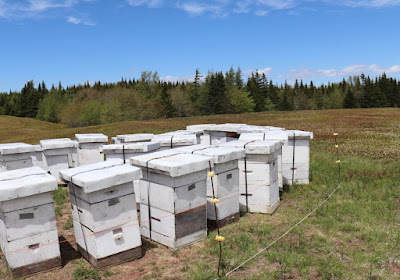In 2020, wild blueberries were Canada’s greatest fruit export with an export value of $312 million (Agriculture and Agri-Food Canada 2021)! This was the result of 71,290 metric tons of wild blueberries, of which the Maritime provinces produced 52% and Quebec 48%. Wild blueberries are an economically valuable crop for the Maritimes and are closely linked to the honey bee industry because blueberry flowers rely on insects for pollination. As such, beekeepers and wild blueberry producers are key partners in eastern Canada. The season for pollination may seem far away, but now is a good time to start organizing pollination services!
Pollination Services
Regionally, the demand for pollination by honeybees is
greater than 50,000 colonies and projected to increase. This represents over $8
million per year in income to Atlantic beekeepers. If you are a beekeeper not
already engaged in pollination, consider diversifying your operation through
pollination services. Sending bees to blueberry fields is hard work, but it is an
important service made easier through thoughtful planning.
Always a valuable resource, Atlantic provincial beekeeping associations can help beekeepers and blueberry producers connect to establish a pollination partnership. Essentially, beekeepers transport their hives to blueberry fields by night when the fields are ready for pollination, around late May or early June. Hives remain on the fields for the duration of bloom and then are retrieved by the beekeeper. Producers typically pay per hive and there is no minimum number of hives that you need to get started! When you do begin, it is a good practice for beekeepers and blueberry producers to agree upon a contract prior to pollination season. Some aspects to consider are the number of colonies required, timing of hive placement and removal, who will be responsible for bear fencing, location for access, and details concerning agrochemical use. The Nova Scotia Beekeepers Association has a sample pollination contract which can be a good place to start.
Another critical point of the contract is establishing a hive strength standard. Optimal hive strength for pollination is a subject which is important to the industry and has not been wholly agreed upon. The NS Beekeepers Association and NB Beekeeper’s Association both offer slightly different provincial minimum hive strength standards for pollination and the Canadian Association of Professional Apiculturists (CAPA) presents yet another. To get to the bottom of this, ATTTA is currently researching hive strength for wild blueberry pollination so that we might be able to establish a uniform hive strength standard and means of assessment across Atlantic Canada for optimal wild blueberry pollination. For more information on measuring hive strength, watch our video on the ATTTA YouTube Channel entitled Bees and Blueberries in Atlantic Canada – the Hive Strength Standard.
Hive strength can be measured in multiple ways. Elements of
the hive which are often quantified are number of bees, amount of brood, and
hive bodies. The trickiest of these to measure is the number of bees within a
given hive. Common methods of estimating the population of a honey bee colony are
counting full frames of bees, seams of bees, or flying bees.
ATTTA collected data from blueberry fields in NB and NS this past summer to evaluate these methods as they relate to pollination success. Our latest video in our Pollination Education series discusses the reliability of counting flying bees returning to the hive as a means of measuring hive strength. Our findings suggest that this is not a reliable method of measuring hive strength in Atlantic Canada, and that cool ambient air temperature skews the results of this method further. For a more detailed account of these results watch the video Assessing Hive Strength: Counting Flying Bees Returning to the Hive.
Stay tuned for more results about optimal hive strength for blueberry pollination and, if you aren’t engaged already, consider adding pollination services to your beekeeping repertoire!
Connecting with ATTTA Specialists

